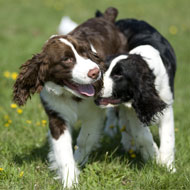
Change would allow vets to dock the tails of specific working breeds
A consultation on whether to introduce an exemption to Scotland’s ban on tail docking has begun.
Views are being sought on a possible change to allow vets to dock the tails of working spaniels and hunt point retriever puppies by a up to a third of their length.
Research commissioned by Glasgow University published in April 2014 suggested that docking the tails of some breeds of working dog while they are puppies could decrease their risk of injury as a working adult.
Tail docking is currently completely banned in Scotland. Elsewhere in the UK, there are exemptions to the bans, allowing certain breeds of working dogs to be docked.
Commenting on the consultation, rural affairs secretary Richard Lochhead described Scotland as “a nation of dog-lovers with some of the highest animal welfare standards in the world”.
He added: “Protecting dogs from avoidable harm and suffering is the whole reason Scotland banned tail docking in the first place. But since then it has been argued that an exemption for specific breeds could help reduce the risk of injury to working dogs.
“This issue has clearly divided opinion which is why it is only right and proper that the Scottish Government formally consults on such an exemption and how it might work in practice.”
Mr Lochhead continued: “Specifically, we are seeking views about a very tightly-defined exemption for spaniels and hunt point Retrievers as well further potential restrictions such as whether docking should be limited to the top third of the tail, or whether the procedure should only be carried out by specially approved veterinary surgeons.”
The Scottish government urge anyone with an interest in the matter to respond before the consultation closes on 3 May, 2016. For more information: visit https://consult.scotland.gov.uk/animal-welfare/proposal-to-permit-tail-docking.



 The RCVS has announced a new version of its 1CPD mobile app, with enhanced features for veterinary surgeons and veterinary nurses to record their continuing professional development.
The RCVS has announced a new version of its 1CPD mobile app, with enhanced features for veterinary surgeons and veterinary nurses to record their continuing professional development.